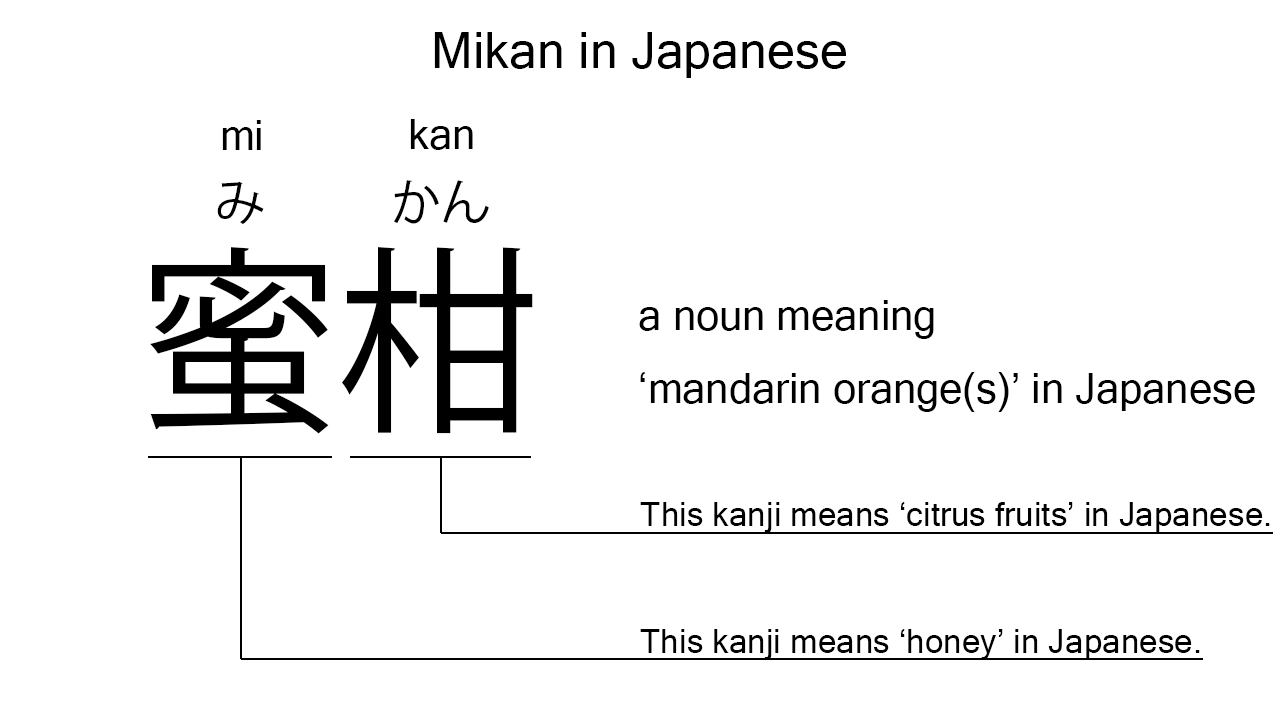What does “mikan” mean in Japanese?
Native speakers say “mikan” often to mean ‘mandarin orange’ in Japanese. Perhaps, some Japanese learners know this word as it is sometimes used in Japanese movies, songs, novels, manga, anime, and the like. In this blog post, however, I will explain this word in detail based on its kanji expression. And also, I will explain how to use it through example sentences. My explanations would help Japanese learners understand “mikan” more clearly. Then, let’s get started!
Contents
Definition and meanings of “mikan”
Let me start with the definition and meanings of “mikan”.
- mikan – 蜜柑 (みかん) : a noun meaning ‘mandarin orange’ or ‘satsuma orange’ in Japanese. This can also work as plural. Learn more about Japanese plural.
The definition and meanings are not that difficult, I think. To understand this noun more clearly, however, let me explain its kanji characters in detail, one by one.
What does “mikan” literally mean in Japanese?
The kanji expression of “mikan” consists of the following two kanji characters:
- 蜜 : a kanji character used to mean ‘honey’ in Japanese.
- 柑 : a kanji character used to mean ‘citrus fruits’ in Japanese.
From these two kanji characters, we can understand that “mikan” literally means ‘honey citrus fruits’ in Japanese. This literal interpretation is not completely in line with the actual meanings, but still understandable, I think. Mandarin oranges and satsuma oranges are often sweet citrus fruits.

When we meet new kanji expressions, we should check their kanji characters in detail to understand their meanings clearly and deeply. In many cases, kanji characters tell us a lot about the meanings of the expressions they form. Actually, here, we could get the better understanding of “mikan” through the detailed kanji check above.
So far, I’ve explained the definition and meanings of “mikan” together with its kanji characters. Then, let me explain how to use it through the example sentences below.
Example #1: how to say “mandarin oranges” in Japanese
kanojo wa mikan ga suki desu – 彼女はみかんが好きです (かのじょはみかんがすきです)
She loves mandarin oranges.
Below are the new words used in the example sentence.
- kanojo – 彼女 (かのじょ) : a pronoun meaning ‘she’ in Japanese.
- wa – は : a binding particle working as a case marker or topic marker. In the example, this works after “kanojo” to make the subject in the sentence.
- ga – が : a case particle used to make the subject word or the object word in a sentence. In the example, this is used after “mikan” to make the object in the sentence.
- suki – 好き (すき) : the stem part of the na-adjective, “sukina”, which means ‘favorite’ in Japanese. Native speakers, however, often use this as an individual word to mean ‘to like’ or ‘to love’ in Japanese. In this example, this is used to mean ‘to love’.
- desu – です : an auxiliary verb used after a noun or adjective to make it polite. Probably, this is well known as a part of Japanese desu form. In the example, this is used after “suki” to make it sound polite.
This is a typical usage of “mikan”. In this example, it works as plural to mean ‘mandarin oranges’ in Japanese. Honestly, I’m not sure how mandarin and satsuma are different. When we want to say “mandarin oranges” or “satsuma oranges” in Japanese, however, “mikan” is a very good option.
Example #2: another usage of “mikan”
boku no neko no namae wa mikan desu – 僕の猫の名前は蜜柑です (ぼくのねこのなまえはみかんです)
The name of my cat is Mikan.
Below are the new words used in the example sentence.
- boku – 僕 (ぼく) : a pronoun meaning ‘I’ in Japanese. This is used mainly by boys and young males.
- no – の : a case particle used after a noun or pronoun to make its possessive case. In the example, this is used after “boku” to make its possessive case, “boku no”, which means ‘my’ in Japanese.
- neko – 猫 (ねこ) : a noun meaning ‘cat’ in Japanese. This can also work as plural.
- no – の : a case particle used to join two nouns. Normally, the first one can work as a modifier to describe the second. In the example, this is used to join “neko” and “namae”. The formed phrase literally means ‘the name of a cat’ in Japanese. Word orders in Japanese and English are different, but the role of this case particle is very similar to that of the English preposition, “of”.
- namae – 名前 (なまえ) : a noun meaning ‘name’ in Japanese. This can also work as plural.
This is another typical usage of “mikan”. Sometimes it can work as a name in Japanese. So, the usage shown in this example is common somehow.
Summary
In this blog post, I’ve explained the definition and meanings of “mikan” in detail based on its kanji expression. And also, I’ve explained how to use it through the example sentences. Let me summarize them as follows.
- mikan – 蜜柑 (みかん) : a noun meaning ‘mandarin orange’ or ‘satsuma orange’ in Japanese. This can also work as plural. These two kanji characters literally mean ‘honey citrus fruits’ in Japanese. This literal interpretation is not completely in line with the actual meanings, but still understandable, I think. Mandarin oranges and satsuma oranges are often sweet citrus fruits. It’s also worth mentioning here that this noun can work as a name in Japanese.
Hope my explanations are understandable and helpful for Japanese learners.